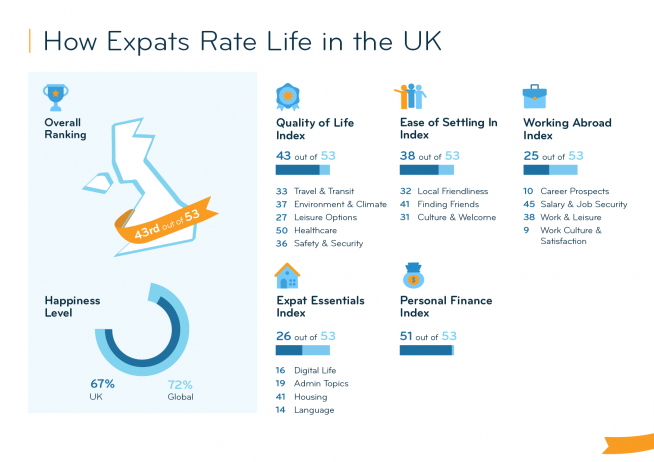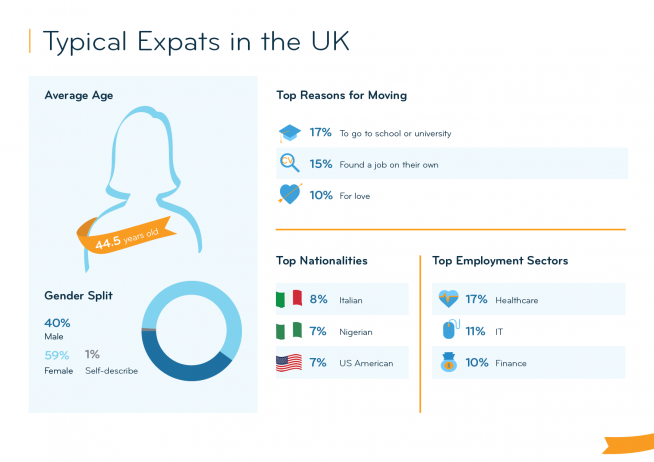Work among the Few Highlights for Expats in the United Kingdom
The UK comes 43rd out of 53 destinations in the Expat Insider 2023 survey. Expats love their working life and the business culture in the UK, but they are worried about the country’s economy and struggle with their personal finances. Though the UK is doing okay — albeit not great — with regard to Expat Essentials and the Ease of Settling In, its performance is much worse when it comes to the Quality of Life. Expats are especially dissatisfied with the healthcare services. Overall, 67% of expats are happy with their life in the UK, compared to 72% globally.
The Pros & Cons of Working in the UK
The UK performs best when it comes to Working Abroad (25th), though there are still some ups and downs in this index. On the negative side, the Salary & Job Security Subcategory (45th) is a particular point of concern for expats in the UK. Over two in five (41%) are unhappy with the state of the local economy, more than double the global average (17%).
Still, the UK still makes it into the top 10 for Career Prospects (10th) and Work Culture & Satisfaction (9th). Despite their evident worries about the British economy, expats still believe that moving to the UK has improved their own career prospects (70% happy vs. 59% globally). Another 64% view their personal job opportunities positively (vs. 57% globally). What’s more, they enjoy the flexibility (79% happy vs. 60% globally), creativity (67% vs. 51% globally), and flat hierarchies (58% vs. 46% globally) that the UK’s business culture offers.
“What I love best about the UK is the opportunity to improve my work situation.” – Italian expat
Housing Poses Plenty of Problems
In the Expat Essentials Index (26th), the UK performs slightly better than average. Expats are clear on how they feel about the English language: it is easy to learn (2nd), but it is very difficult to live in the UK without speaking it (49th). The country gets quite good results for both Digital Life (16th) and Admin Topics (19th). For example, 92% of expats consider it easy to pay without cash (vs. 84% globally), and 55% have no trouble dealing with the local bureaucracy (vs. 39% globally).
However, the Housing Subcategory (41st) remains a lowlight. Two out of five expats (40%) struggle with finding housing in the UK (vs. 31% globally), and 56% describe it as unaffordable (vs. 42% globally).
Many Financial Woes
Unaffordable housing is not the only financial problem that expats face. Finances in general are among the biggest worries for expats in the UK. In the Personal Finance Index (51st), the country ends up among the bottom 3. In fact, since 2017, the UK has consistently ranked very poorly in this area. Regarding the respondents’ satisfaction with their own financial situation, the UK even comes second to last: 32% are not happy with this factor, 10 percentage points more than the global average (22%). Another 39% do not consider their household income enough for a comfortable life in the UK, compared to 27% worldwide.
A Dissatisfying Healthcare & Social Life
The Quality of Life Index (43rd) is another one of the UK’s weaknesses. The Healthcare Subcategory (50th) is a particularly sore spot. Expats criticize both the quality (29% unhappy vs. 14% globally) and the availability (26% unhappy vs. 14% globally) of medical care. One in three (33%) even does not have access to all the healthcare services they need (vs. 19% globally). And they rank the country in the bottom 10 for personal safety (46th).
“The healthcare situation is pretty bad. For example, it is difficult to get an appointment with a specialist.” – German expat
Lastly, the UK’s results are slightly below-average in the Ease of Settling In Index (38th). Nearly one in three expats (31%) are unhappy with their social life in the UK (vs. 25% globally). However, 63% find it easy to get used to the local culture, about the same as the worldwide average (62%).





